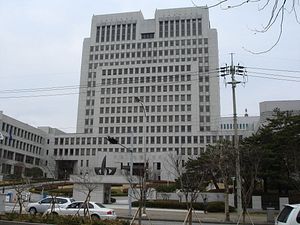In December 2016, the South Korean National Assembly voted to remove President Park Geun-hye from office after weeks of public protest over an influence peddling scandal surrounding her close personal confidant Choi Soon-sil. The South Korean Constitutional Court upheld Park’s impeachment last year, seemingly bringing the scandal to a close, but now new accusations of impropriety have emerged surrounding the South Korean Supreme Court’s ties to the Park administration.
During his time as chief justice of the Supreme Court, Yang Sung-tae is alleged to have worked to influence politically sensitive trials to gain influence with the Park administration to support his efforts to set up a new Court of Appeals. Yang hoped to establish a new Court of Appeals to lighten the Supreme Court’s case load so it could take on more significant cases.
As part of the investigation, prosecutors are looking into allegations that Yang sought to curry favor with the Park administration by pressuring judges for favorable rulings on a case to grant reparations to South Koreans forced to work during the colonial period as the government sought to improve relations with Japan and a case involving the Park administration’s decision to outlaw the Korean Teachers and Education Workers Union.
In addition, Yang is thought to have used funds from lower courts to create a slush fund to pay incentives to district court chiefs and senior judges, while also maintaining a blacklist of progressive judges and surveillance of judges critical of his plan. However, prosecutors have faced challenges from lower courts, which have rejected search warrants for officials believed to be involved in the scandal.
There are also accusations that Yang sought to “rein in” rulings by the Constitutional Court that were at odds with Supreme Court rulings. In the South Korean legal system, the roles of the last court of appeal and the arbiter of which laws are constitutional are divided between the Supreme Court and the Constitutional Court. Under the South Korean Constitution, the Supreme Court serves as the court of last appeal and is required to request a decision from the Constitutional Court when the constitutionality of a law comes into question. However, it does have jurisdiction over the constitutionality of administrative decrees and regulations. In addition to questions regarding the constitutionality of a law, the Constitutional Court reviews impeachments, handles the dissolution of political parties, disputes between government agencies, and whether the state has violated the rights of the people.
A judge on assignment to the Constitutional Court from the National Courts Administration (NCA), the Supreme Court’s top administrative body, is also believed to have written a report on an internal meeting related to a case adverse to the government and to have passed along classified documents from the Park impeachment and other cases to a judge on the Seoul Central District Court. Yang is believed to have used these documents to help gain an advantage in talks with the Constitutional Court and gain insights into the future political dynamics from the impeachment.
The current crisis has further undermined faith in the court system in South Korea, where favorable decisions to the heads of the chaebol and the recent early release of Lee Jae-young of Samsung had already created a sense that the court system was unjust. Polling prior to the current scandal indicated that 60 percent of the South Korean public lacked faith in the court system to adjudicate the law fairly.
In response to the crisis, President Moon Jae-in has called for the Supreme Court to undertake self-reform to restore the public’s trust. While much work still needs to be done, the NCA is set to be abolished as part of the fallout from the scandal.
































